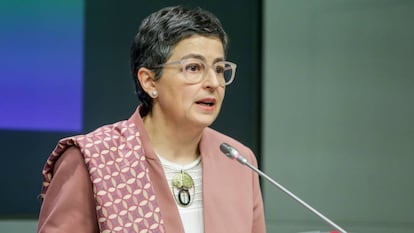Berlin, Paris hoping Spain will stay close to EU’s French-German bloc
The new Spanish foreign minister has said that the country could form different alliances depending on its interests


France and Germany, considered the traditional axis of the European Union, are hoping that the Spanish government will remain a firm ally despite statements by Foreign Minister Arancha González Laya about seeking to diversify ties within the 27-country bloc.
In the space of just a few months, Spain has gone from embracing a G-3 of sorts with France and Germany to considering new alliances. These could include cooperation with Poland and Hungary in the battle to preserve European cohesion funds.
It makes sense to complement alliances with other states, but there is no substantial reason to justify walking away from the Franco-German axisIgnacio Molina, senior analyst at the Elcano Royal Institute
Toward the end of former Foreign Minister Josep Borrell’s term in office, there were attempts at opening up to alternative alliances as Europe moved to a post-Brexit scenario. But it is González Laya’s first steps at the helm of the Foreign Ministry that have most clearly set the new tone.
Sources consulted by this newspaper played down this difference and instead highlighted Spain’s pro-European sentiment as a key to EU collaboration.
“It is normal for each country to seek out partners based on its own interests regarding a specific issue,” said a German diplomat. “This is not a big surprise, and you could also see it happening with Borrell. “The main thing, and there is no question about this, is that everyone should row in the same direction: for a Europe that is strong and shows solidarity.”
A French diplomatic source said that Spain remains a key player in the new European landscape that opened up when Britain left the club on January 31. “We cannot build a sovereign Europe without great involvement by Spain,” said this source. “France and Germany expect a lot from their main partners, particularly from Spain, in order to address Europe’s challenges.”
Everyone should row in the same direction: for a Europe that is strong and shows solidarityAnonymous German diplomat
Since 1986, the year it joined the European club, Spain has stuck close to the French-German axis. “The only time we went our own way was in 2001, under [former Prime Minister] José María Aznar, and that was a strategic move prompted by the Iraq war,” notes Ignacio Molina, a senior analyst at Elcano Royal Institute. “It is not possible to distance yourself from the axis: [Hungarian PM Viktor] Orban can do it, the way that Aznar did, but everything in the EU goes through that core group.”
In early February, González Laya told this newspaper that she wished to cooperate with France and Germany on some policies, but not on all. “On other issues, the geometry will be a little bit different,” she said, citing a few countries from Eastern Europe that follow opposite policies from Spain on issues such as immigration or the rule of law. In spite of this, Spain could consider these countries allies on matters such as EU cohesion policy.
In her initial days in office, the new minister received Mediterranean colleagues first, notably Italy’s Luigi di Maio and Greece’s Nikos Dendias. But two sources who spoke on condition of anonymity said there is no particular state strategy behind the move. Instead, it is González Laya’s own take on the role that Spain should play within a bloc that has just lost its second-biggest economy, triggering a political reshuffle on the continent.
The minister will appear before Congress for the first time this coming Thursday, when she will discuss the main lines of her work as head of Spanish diplomacy.
González Laya was asked to come Berlin by Germany’s foreign minister, the social-democrat Heiko Maas, in the welcome letter he sent her following her appointment. While these letters are part of the protocol, they do not always include an invitation. No date has been set yet for the meeting.
This week, a lower-level bilateral meeting between Spain and France is taking place in Madrid, where the Spanish Secretary of State for European Affairs, Juan González-Barba, will meet with his French counterpart, Amélie de Montchalin. These two officials will also meet with a Portuguese representative to discuss electricity connections between their countries.
The Elcano analyst trusts that González Laya’s early remarks will not result in a more distant relationship between Spain, France and Germany. “It makes sense to complement alliances with other states, but there is no substantial reason to justify walking away from the Franco-German axis,” said Ignacio Molina.
Spain and Italy
Since Arancha González Laya’s appointment as Spanish foreign minister, Italy has shown itself to be on a similar wavelength to Spain. Following the meeting between both foreign ministers, both countries are now working on a new bilateral meeting between their interior ministers, Fernando Grande-Marlaska of Spain and Luciana Lamorgese of Italy, said diplomatic sources.
Both countries share the common challenge of immigration in the Mediterranean region. Until recently, however, both countries had had their backs to each other on this issue, largely due to the closed-port policy pursued by former Italian interior minister Matteo Salvini. A few days ago, Ministers Di Maio and González Laya also spoke about Venezuela, and pledged to seek solutions.
English version by Susana Urra.
Tu suscripción se está usando en otro dispositivo
¿Quieres añadir otro usuario a tu suscripción?
Si continúas leyendo en este dispositivo, no se podrá leer en el otro.
FlechaTu suscripción se está usando en otro dispositivo y solo puedes acceder a EL PAÍS desde un dispositivo a la vez.
Si quieres compartir tu cuenta, cambia tu suscripción a la modalidad Premium, así podrás añadir otro usuario. Cada uno accederá con su propia cuenta de email, lo que os permitirá personalizar vuestra experiencia en EL PAÍS.
¿Tienes una suscripción de empresa? Accede aquí para contratar más cuentas.
En el caso de no saber quién está usando tu cuenta, te recomendamos cambiar tu contraseña aquí.
Si decides continuar compartiendo tu cuenta, este mensaje se mostrará en tu dispositivo y en el de la otra persona que está usando tu cuenta de forma indefinida, afectando a tu experiencia de lectura. Puedes consultar aquí los términos y condiciones de la suscripción digital.








































